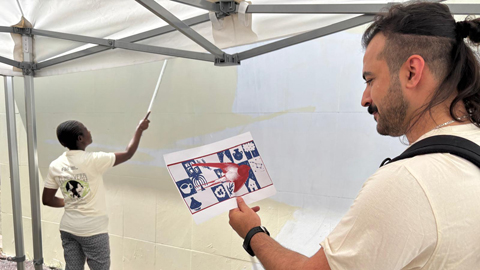The UAB Refugee Programme has awarded 49 grants this academic year and consolidates its model of comprehensive university reception
Coinciding with World Refugee Day, which is commemorated on 20 June, the UAB organises a meeting in the Plaça Cívica in which UAB student volunteers and young refugees from different countries will come together to paint a graffiti. This year, 49 students seeking refuge have received grants and academic, social and institutional support. Ukraine, Syria and Palestine are the countries of origin of most of the programme's students.

The UAB is one of the pioneering universities in Catalonia in the reception of people seeking refuge and applicants for international protection, and offers a programme that includes mentoring by volunteer students from the UAB.
The UAB Refugee Programme, promoted by the Fundació Autònoma Solidària (FAS) and active since 2016, consolidates a model of university reception that aims to guarantee the right to higher education for people seeking refuge and applicants for international protection, through comprehensive support. In order to favour the reconstruction of the lives and future of these people, they are offered academic, social and institutional support. The programme also extends its scope by providing training, awareness-raising activities, and a university volunteer programme.
The Universitat Autònoma de Barcelona (UAB), through its UAB Refugee Programme, has awarded 49 #UABRefugi grants during the 2024/25 academic year, which cover the full tuition and various university fees. It also promotes other lines of support for students in situations of refuge or forced displacement, such as extraordinary grants for young people from Palestine or Ukraine, and study grants (which pay for internships, academic materials and transport costs). In total, these calls received a budget of 278,000 euros. The UAB is among the universities with the highest number of refugees receiving grants.
Most of the beneficiaries come from Ukraine (11 students), Syria (7) and Palestine (7), areas marked by armed conflicts and humanitarian tensions. There are also students from Russia (6) and Afghanistan (5). The list is completed by students from Colombia (4), Iran (2) and other countries such as Cuba, Honduras, Iraq, Morocco, Nicaragua and Peru, with one student per nationality.
Of all the beneficiaries for the 2024/25 academic year, 23 are students who were already part of the programme and are renewing their grants, and 26 are joining this year as new participants. In total, there are 29 women and 20 men, reflecting the programme's commitment to gender-sensitive reception.
As for the level of studies, the grants are distributed among 30 bachelor's degree, 9 master's degree and 10 PhD students, enrolled in various faculties: Medicine, Law, Psychology and Speech Therapy, Biosciences, Political Science and Sociology, Translation and Interpreting, Arts & Humanities, others, as well as the School of Engineering.
Mentoring and volunteer students
The action model of the UAB Refugee Programme includes comprehensive and personalised support to each participant.
A total of 14 pairs of social mentorships have been formed with UAB student volunteers and refugees from the Spanish Commission for Refugee Aid (CEAR). And 33 UAB student volunteers have actively collaborated in these actions, with language support and awareness-raising activities.
The programme also offered various training and orientation actions, such as welcome sessions, publication of a welcome guide, information on immigration laws, referrals to specialised legal services, etc.
The program has also responded to 141 requests for information from people seeking international protection. In addition, 51 people have been housed in the Vila Universitària, an action managed by CEAR. These are young people who are housed in the apartments of the Vila Universitària during the first phase of the reception plan for asylum seekers and receive psychosocial support, language courses and job orientation.
The FAS is also working to incorporate the subject of refuge into teaching plans. During this academic year, training capsules have been carried out in nine subjects in five faculties of the UAB. In addition, film forums and awareness-raising activities have been organised in the Plaça Cívica and training provided to technical, management and administration and services staff (PTGAS). In total, almost a thousand people participated in these actions and were able to deepen their knowledge on this subject.
The UAB Refugee Programme is financed by the UAB itself and public subsidies from the Government of Catalonia. Currently, a new call for grants is open.
World Refugee Day
Coinciding with the World Refugee Day on Friday 20 June the UAB Refugee Programme organises an end of the c ourse event with participants. The event will take place from 11:00 a.m. to 3:00 p.m. in the Plaça Cívica and will include the creation of a participatory mural, led by the Acaudemur group, through which FAS volunteers and young refugees will paint a graffiti together. Thus, art will be used as a tool for social transformation to generate spaces for dialogue.
In addition, a testimonial video will be published by two refugee students, from Palestine and Colombia, who have participated in the UAB Refugee Programme, in which they share their experience of arriving at the University, the reception, challenges, difficulties and proposals for improvement.
The UAB, with Sustainable Development Goals
Peace, justice and strong institutions